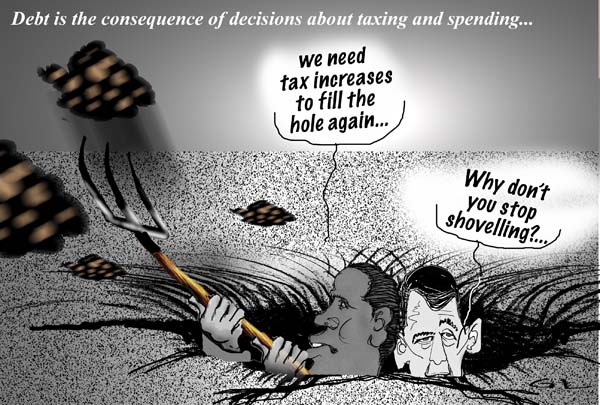Search
Recent comments
- american "diplomacy"
59 min 18 sec ago - deceit america....
3 hours 18 min ago - police-state....
12 hours 58 min ago - the war continues....
13 hours 46 min ago - scott is angry.....
20 hours 47 min ago - a catastrophe?....
1 day 26 min ago - 3Xwars is 3Xpeace?....
1 day 2 hours ago - futile trousers....
1 day 2 hours ago - reading reality....
1 day 3 hours ago - colonel blimp....
1 day 3 hours ago
Democracy Links
Member's Off-site Blogs
raising the roof...

To the Limit
In about a month, if nothing is done, the federal government will hit its legal debt limit. There will be dire consequences if this limit isn’t raised. At best, we’ll suffer an economic slowdown; at worst we’ll plunge back into the depths of the 2008-9 financial crisis.
So is a failure to raise the debt ceiling unthinkable? Not at all.
Many commentators remain complacent about the debt ceiling; the very gravity of the consequences if the ceiling isn’t raised, they say, ensures that in the end politicians will do what must be done. But this complacency misses two important facts about the situation: the extremism of the modern G.O.P., and the urgent need for President Obama to draw a line in the sand against further extortion.
Let’s talk about how we got here.
The federal debt limit is a strange quirk of U.S. budget law: since debt is the consequence of decisions about taxing and spending, and Congress already makes those taxing and spending decisions, why require an additional vote on debt? And traditionally the debt limit has been treated as a minor detail. During the administration of former President George W. Bush — who added more than $4 trillion to the national debt — Congress, with little fanfare, voted to raise the debt ceiling no less than seven times.
So the use of the debt ceiling to extort political concessions is something new in American politics. And it seems to have come as a complete surprise to Mr. Obama.
Last December, after Mr. Obama agreed to extend the Bush tax cuts — a move that many people, myself included, viewed as in effect a concession to Republican blackmail — Marc Ambinder of The Atlantic asked why the deal hadn’t included a rise in the debt limit, so as to forestall another hostage situation (my words, not Mr. Ambinder’s).
The president’s response seemed clueless even then. He asserted that “nobody, Democrat or Republican, is willing to see the full faith and credit of the United States government collapse,” and that he was sure that John Boehner, as speaker of the House, would accept his “responsibilities to govern.”
Well, we’ve seen how that worked out.
http://www.nytimes.com/2011/07/01/opinion/01krugman.html?_r=1&hp=&pagewanted=print
- By Gus Leonisky at 1 Jul 2011 - 5:42pm
- Gus Leonisky's blog
- Login or register to post comments
blackmail...
WASHINGTON — The White House believes it must strike a budget deal with Congress by July 22 to avoid a risk of defaulting on the national debt, Democratic officials briefed on the negotiations said Thursday, as Senate leaders canceled a recess next week to try to break the deadlock with Republicans.
http://www.nytimes.com/2011/07/01/us/politics/01budget.html?hp
the next frame...
centristman
http://www.nytimes.com/slideshow/2011/07/03/opinion/sunday/20110703_CARTOONstrip.html
no sense of moral decency
From David Brooks
...
This, as I say, is the mother of all no-brainers.
But we can have no confidence that the Republicans will seize this opportunity. That’s because the Republican Party may no longer be a normal party. Over the past few years, it has been infected by a faction that is more of a psychological protest than a practical, governing alternative.
The members of this movement do not accept the logic of compromise, no matter how sweet the terms. If you ask them to raise taxes by an inch in order to cut government by a foot, they will say no. If you ask them to raise taxes by an inch to cut government by a yard, they will still say no.
The members of this movement do not accept the legitimacy of scholars and intellectual authorities. A thousand impartial experts may tell them that a default on the debt would have calamitous effects, far worse than raising tax revenues a bit. But the members of this movement refuse to believe it.
The members of this movement have no sense of moral decency. A nation makes a sacred pledge to pay the money back when it borrows money. But the members of this movement talk blandly of default and are willing to stain their nation’s honor.
http://www.nytimes.com/2011/07/05/opinion/05brooks.html?_r=1&src=ISMR_HP_LO_MST_FB
Superb article! Debt ceiling
Superb article! Debt ceiling is a cap set by Congress on the amount of debt the federal government can legally borrow. The cap applies to debt owed to the public (i.e., anyone who buys U.S. bonds) plus debt owed to federal government trust funds such as those for Social Security and Medicare. Indeed, this has been a hot polemic for months already. And just recently, Obama walks out of debt ceiling debate saying he has reached his limit, and this gained lot of reactions. Moreover, the rapidly-approaching deadline to raise the debt ceiling is August 2. The impact might be disastrous for the country's economy if it defaults on debts and receives a reduced credit rating.